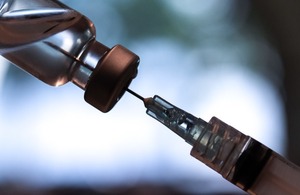VDEC is supporting a GBS vaccine to prevent newborn deaths
Antimicrobial resistance to Group B Streptococcus (GBS) antibiotics is growing. This puts newborns at risk. VDEC is supporting a new vaccine to cut antibiotic use

Background
The vaccine development and evaluation centre (VDEC) facilitates the development and evaluation of new vaccines and therapeutics.
VDEC’s work includes vaccine discovery and surveillance. The Vaccine Assay and Immune Response team within VDEC provides world class scientific expertise and regulated facilities to enable the classification of diseases, pathogens and their mechanisms of action. They also provide continued national surveillance after the release of vaccines.
They have recently been supporting the creation of a maternal vaccine for Group B Streptococcus (GBS).
Work with VDEC
We work with industry, academia and government. Contact UKHSA today to see how we can help you.
Target
GBS is the leading cause of vaccine-preventable infections in newborns in the developed world, and a significant cause of newborn infections and stillbirths worldwide. As such, GBS is a leading driver of antibiotic use in neonatal settings, and antimicrobial resistance is increasing.
To reduce early-onset disease (usually within the first 48 hours of life) many countries have introduced screening for GBS in pregnancy. Culture positive mothers are then given intravenous antibiotics in childbirth to protect both the mother and the infant. This has dramatically increased the use of antibiotics in childbirth. In some countries over 50% of childbirths now involve intravenous antibiotic use.
Aims
A maternal vaccine for GBS which protects infants from both early and late onset disease (for which intrapartum antibiotics have no effect) will have a positive impact on infant mortality and morbidity. It will also lead to a sharp reduction in the use of antibiotics in neonatal units worldwide.
Issues
Reducing antibiotic use in newborns will allow the development of appropriate commensal gut bacteria. This enables them to digest milk and reduces the risk of antimicrobial resistance.
Options
The UKHSA Pathogen Immunology Group at Porton Down had previously been part of the GASTON consortium. This is an international consortium to develop standardised correlates of protection to allow the evaluation of new GBS vaccines and enable licensure of the leading candidates.
UKHSA Porton successfully developed a ‘Gold Standard’ opsonophagocytic killing assay (OPKA) and led a global interlaboratory study of the OPKA in public health, academic and industry labs. The assay was shown to be highly sensitive and reproducible in different laboratories, and standard GBS test strains have been selected by UKHSA and made available worldwide.
What VDEC offers
In 2022 to 2023, follow-on funding was awarded by the Bill and Melinda Gates Foundation (BMGF) to develop a higher-throughput version of the OPKA suitable for Phase II/III clinical trials and to provide international reference serum samples with defined units of opsonophagocytic activity. The high throughput OPKA is required as the current assay method is very labour-intensive which limits the number of sera that can be analysed in large vaccine studies.
Expected outcome
Licensure of a GBS vaccine will:
- prevent the deaths of tens of thousands of newborns worldwide
- reduce the need for antibiotic treatment in disease cases
- reduce the need for intrapartum antibiotics during childbirth
Future work
As part of this project, the team has also developed an OPKA for GBS serotype VII, which will be used in a follow-up PATH-funded Phase I/II clinical study of a novel 6-valent GBS vaccine currently being developed.
Updates to this page
-
Added the VDEC form link.
-
Added the PDF version of the case study.
-
First published.